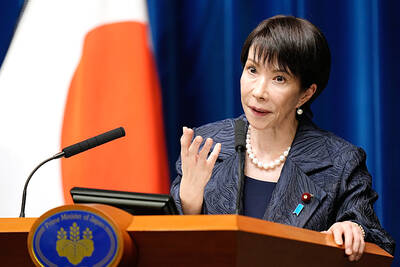Although fangsheng (
Buddhist organizations such as the China Preserve Life Association regularly release a large number of fish into the nation's streams and oceans.
But Chen Yi-hsiung (陳義雄) of National Taiwan Ocean University said at the International Conference on Religion, Animals and Environment in Taipei yesterday that it was not the number of fish released into the wild that causes the most harm, but rather the possibility that invasive exotic species are inadvertently introduced into habitats.
Freshwater habitats such as rivers, streams and lakes are the most vulnerable, Chen said.
Chen presented a study at the conference on the impact of religious releases on stream habitats.
"There are some rivers in Taiwan where 98 fish out of 100 are South American cichlids (吳郭魚)," he said. "I am a Buddhist myself, but I am totally against the non-professional release of animal life into the wild. Animal release is a destructive practice that is not in the basic tenets of Buddhism."
Those who wish to preserve life should preserve wild habitat instead, Chen said.
"That would be a positive outlet for the impulse to be merciful," he said.
The conference, held at the Academia Sinica, aimed to stimulate dialogue on the use of animals in religious practice, said Chu Ruey-ling (朱瑞玲), the conference's convener and a researcher at Academia Sinica's Institute of Ethnology.
"We have invited biologists, anthropologists, religious leaders and animal rights activists to start a conversation, not to offer a conclusion," she said.
"The majority of Buddhists do not practise animal release and our studies show that less than 5 percent of Taiwanese have participated in fangsheng ceremonies," she said.
Mainstream Buddhist organizations are increasingly shunning the practice of religious animal release in the face of increasing criticism by environmentalists.
However, new groups specializing in fangsheng have come into existence, said Lin Pen-hsuan (
"Without any disrespect to religion, we analyze the religious world using the metaphor of a marketplace," Lin said. "As long as the demand for fangsheng exists, new firms will supply the product to meet the demand."
"A certain portion of the population believes in animal release as a way of accumulating merit," he said. "If they get sick, they might try western medicine, Chinese medicine and then fangsheng, if nothing else works."
Some mainstream Buddhist organizations that no longer practice fangsheng are still loathe to condemn it, Lin said, while placing government regulations on the practice could infringe on the right to religious freedom.
"We need more education on the negative repercussions of fangsheng in order to change attitudes," he said.

The Ministry of Foreign Affairs (MOFA) yesterday voiced dissatisfaction with the Comprehensive and Progressive Agreement for Trans- Pacific Partnership (CPTPP), whose latest meeting, concluded earlier the same day, appeared not to address the country’s application. In a statement, MOFA said the CPTPP commission had "once again failed to fairly process Taiwan’s application," attributing the inaction to the bloc’s "succumbing to political pressure," without elaborating. Taiwan submitted its CPTPP application under the name "Separate Customs Territory of Taiwan, Penghu, Kinmen and Matsu" on Sept. 22, 2021 -- less than a week after China

THE GOOD WORD: More than 100 colleges on both sides of the Pacific will work together to bring students to Taiwan so they can learn Mandarin where it is spoken A total of 102 universities from Taiwan and the US are collaborating in a push to promote Taiwan as the first-choice place to learn Mandarin, with seven Mandarin learning centers stood up in the US to train and support teachers, the Foundation for International Cooperation in Higher Education of Taiwan (FICHET) said. At the annual convention of the American Council on the Teaching of Foreign Languages held over the weekend in New Orleans, Louisiana, a Taiwan Pavilion was jointly run by 17 representative teams from the FICHET, the Overseas Community Affairs Council, the Steering Committee for the Test of Proficiency-Huayu, the

A home-style restaurant opened by a Taiwanese woman in Quezon City in Metro Manila has been featured in the first-ever Michelin Guide honoring exceptional restaurants in the Philippines. The restaurant, Fong Wei Wu (豐味屋), was one of 74 eateries to receive a “Michelin Selected” honor in the guide, while one restaurant received two Michelin stars, eight received one star and 25 were awarded a “Bib Gourmand.” The guide, which was limited to restaurants in Metro Manila and Cebu, was published on Oct. 30. In an interview, Feng Wei Wu’s owner and chef, Linda, said that as a restaurateur in her 60s, receiving an

MORE RETALIATION: China would adopt a long-term pressure strategy to prevent other countries or future prime ministers following in Sanae Takaichi’s steps, an academic said Taiwan should maintain communications with Japan, as Japanese Prime Minister Sanae Takaichi is to lead a revision of security documents, Taiwanese academics said yesterday. Tensions have risen between Japan and China over remarks by Takaichi earlier this month that the use of force against Taiwan would constitute a “survival-threatening situation” for Japan. Prospect Foundation president Lai I-chung (賴怡忠) yesterday said Takaichi’s stance regarding Taiwan is the same as past Japanese prime ministers, but her position is clearer than that of her predecessors Fumio Kishida and Shigeru Ishiba. Although Japan views a “Taiwan contingency” as a “survival-threatening situation,” which would allow its military to